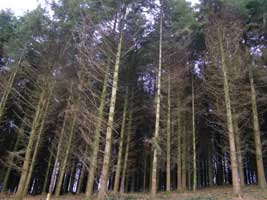 Do you buy FSC wood? We usually do for our business and home because of it's environmental credentials. But now I've found out that we might well be doing more good buying British wood. That's because almost all the woodland in the UK is pretty much sustainably managed (give or take a few cowboys). You can't legally fell more than 5 cubic metres of wood in any calendar quarter without a licence from the Forestry Commission, even if it's on your own land. And they don't usually give a licence with insisting that you restock the area, and keep it restocked for at least 10 years. (Here's a summary of the rules, if you're interested.)
Do you buy FSC wood? We usually do for our business and home because of it's environmental credentials. But now I've found out that we might well be doing more good buying British wood. That's because almost all the woodland in the UK is pretty much sustainably managed (give or take a few cowboys). You can't legally fell more than 5 cubic metres of wood in any calendar quarter without a licence from the Forestry Commission, even if it's on your own land. And they don't usually give a licence with insisting that you restock the area, and keep it restocked for at least 10 years. (Here's a summary of the rules, if you're interested.)So when you compare that with the environmental cost of shipping timber in from overseas, or the unknowns of non-certified timber, buying British looks like the responsible action.
And it can really help UK conservation. Here in Devon, we've found a really local source of timber - a 55 year old plantation that is being felled to reveal and regenerate the original oak woodland it covers. More about that on our Wheatland Farm blog, but here are a couple of pictures. It's going from this...

to this...

Some interesting snippets:
- Apparently, South Africa has certified all of it's timber as FSC approved
- The UK hasn't done very well with woodland conservation in the past. Thousands of years ago most of Britan would have been forested, but as long as 1,000 years ago coverage had fallen to about 15%. And by 1900 we reached a low point of 5%. Since then things have got a little better, with about 8% of land cover wooded by 2000.
- And here's an alarming thought. By the time you make a wooden floor, about 75% of the wood will have gone to waste...



